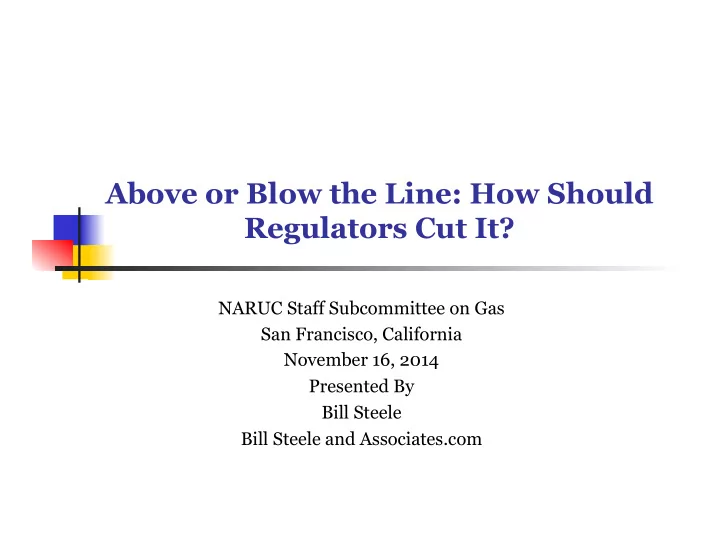

Above or Blow the Line: How Should Regulators Cut It? NARUC Staff Subcommittee on Gas San Francisco, California November 16, 2014 Presented By Bill Steele Bill Steele and Associates.com
Presentation Outline Ø Do ratepayers benefit from expenditures that tend to benefit investors more that customers such as donations, advertising, utility write-offs and executive compensation and perks? Ø Who benefits from the payment of bonuses – the ratepayer or the company management/ shareholders? Ø Should these issues only be addressed in a general rate case or should they be left open pending individual consideration?
Do Ratepayers Benefit From Investor Related Expenditures? u Management exercises its prerogative in incurring expenses. The commission reviews the expenses incurred by management and decides whether to allow or disallow the expense for rate-making purposes (allowed if prudent and related to the provision of safe and reliable service to customers). u Above-the-line expenses are allowed expenses and paid from regulated rates (examples: fuel, property taxes and other costs prudently acquired and necessary for the provision of safe and reliable utility service). u Below-the-line expenses are disallowed expenses and paid out of stockholder earnings (examples: lobbying expenses, most advertisement expenses and expenses associated with a unregulated service provided by the utility).
Do Ratepayers Benefit From Investor Related Expenditures? u The key test in determining prudence is whether the cost has a direct benefit to the ratepayers. u If not then it should be disallowed and booked below-the-line. u Therefore write-offs because of utility mistakes, certain perks (country clubs, etc.) should not be allowed because they do not have a direct benefit to the ratepayer. u Expenses such as advertising and donations should be examined on an item specific basis to determine if they have a direct benefit to the ratepayer. Those expenses that fail to meet this test should be disallowed and booked below-the-line. u Executive compensation should be examined using compensation studies to determine whether they are excessive. If the executive compensation exceeds industry norm, then the portion of the excess compensation should be considered for disallowance.
Who Benefits From the Payment of Bonuses? Ø Bonuses like executive compensation should be examined and compared to industry norms. Ø The actual bonus structure should be examined to determine if bonuses are given for enhancing utility service or for enhancing shareholder’s wealth, i.e. net income. Ø That part of the bonus structure which is designed to enhance shareholders wealth should be disallowed. Ø If the record lacks clarity on how the bonus structure has a direct benefit to ratepayers, then the commission should consider total or partial disallowance of the cost of the bonuses until such time that the utility demonstrates that the bonus structure has a direct benefit to the ratepayer.
Should These Issues Only be Addressed in a General Rate Case? u These issues have been traditionally reviewed in the context of a general rate case and that process should continue. u If these issues remain open after the conclusion of a rate case in order to be later examined on an individual basis at a latter date, the question may arise whether this type of review would be tantamount to single issue ratemaking. u If any of these issues appears to have a significant impact on the “Public Interest” in between rate cases, a commission could conduct a special investigation into that issue. However, in all probability a rate adjustment regarding one of these issues would need to occur in the context of a rate case or the result of a commission determination in an earnings compliant case.
Concluding Remarks u The issue of whether a cost should be considered as above the line or below for cost recovery in rates is a question that is as old as public utility regulation. u The primary criterion is whether that cost has a direct benefit to the ratepayers. u Those costs that failed to demonstrate a direct benefit to the ratepayer should be booked below-the-line.
Recommend
More recommend